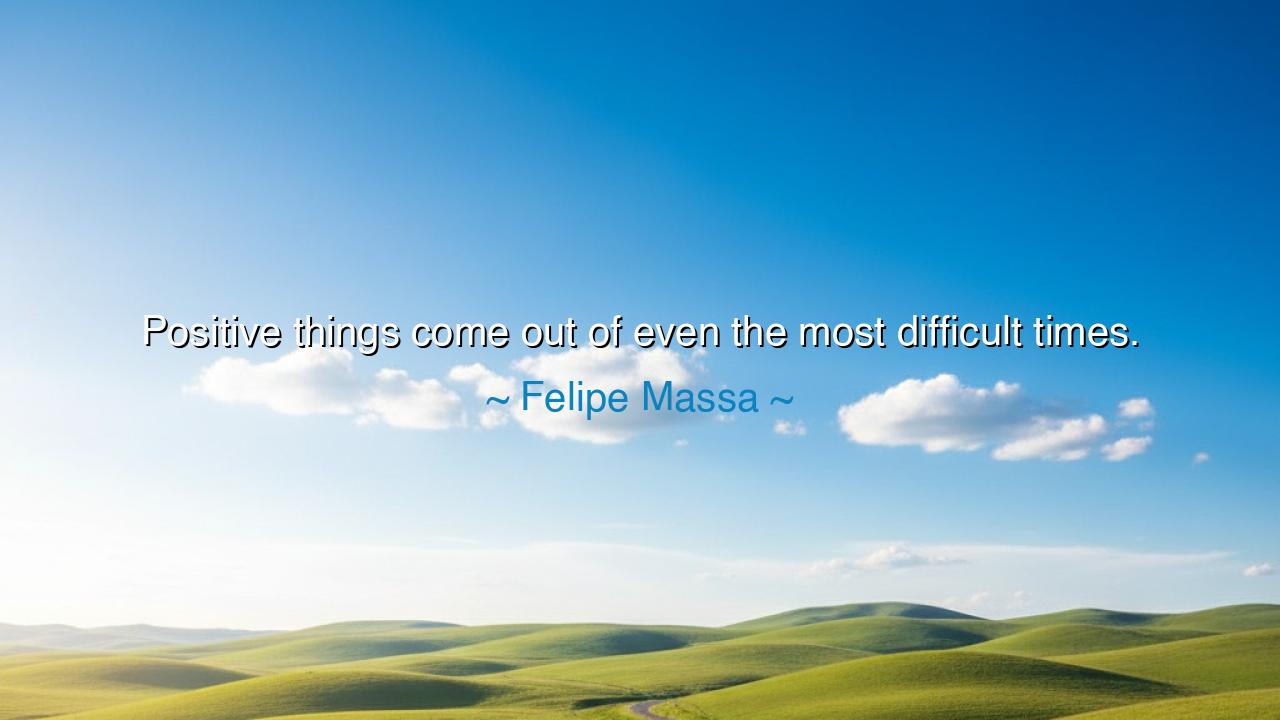
Positive things come out of even the most difficult times.






Hear the words of Felipe Massa, a warrior of the racetrack who has known both triumph and despair: “Positive things come out of even the most difficult times.” These are not the idle musings of one untouched by hardship, but the hard-won wisdom of a man who has faced the peril of speed, the sting of failure, and the uncertainty of survival. His words carry the weight of fire refined in the furnace—reminding us that struggle is not merely something to endure, but a teacher that shapes the soul.
To say that positive things arise from difficult times is to declare that pain itself can be transfigured. For suffering does not come to break us only; it comes also to reveal within us strengths we did not know we possessed. Hardship is the soil in which endurance grows, the night through which hope shines brighter, the trial that births wisdom. Without difficulty, courage would remain hidden, patience would lie dormant, and compassion would never blossom. Thus Massa’s words echo the ancient truth: what seems like ruin often becomes the root of renewal.
The ancients knew this law of life well. In the myth of Prometheus, who suffered in chains for gifting fire to humanity, his torment did not extinguish the gift but immortalized it. The fire of knowledge, born through pain, became the blessing of mankind. Likewise, in every difficult time, though chains and wounds may seem to dominate, there remains a hidden treasure—a positive thing waiting to be revealed when one refuses to surrender.
History too testifies. Recall the long years of Winston Churchill before he was called to lead Britain through its darkest hour. Branded a failure, exiled from influence, and dismissed as reckless, he endured ridicule and loneliness. Yet those difficult times prepared him with resilience, sharpened his vision, and strengthened his voice. When war erupted, it was precisely his hard-earned fortitude that allowed him to rally a nation with words of steel. Out of rejection and hardship came the positive strength that saved millions.
Felipe Massa himself knew such trials. In 2009, a near-fatal accident at the Hungarian Grand Prix left him injured and uncertain if he would race again. To many, it seemed like the end of his career. But from this moment of darkness came not only his recovery, but also a deepened appreciation of life, resilience, and the love of those who stood beside him. His story proves his own words: even in disaster, positive things may rise, if the heart chooses to endure.
The teaching is thus: do not despise difficult times when they arrive, for they are not only destroyers but also makers. They strip away illusions, but in doing so, they reveal truth. They bend us, but in bending they make us more supple and more enduring. To curse hardship is natural, but to search within it for what it teaches—this is the way of wisdom, the path of growth.
Practical steps flow from this truth. When hardship strikes, do not ask only, “Why me?” but also, “What strength, what wisdom, what compassion can be born here?” Write down the lessons you see, however small. Practice gratitude, even if only for the breath in your lungs or the hand of a friend. Surround yourself with those who remind you of the light beyond the shadow. By doing so, you turn difficult times into seeds of growth, and you ensure that when the trial passes, you carry forward treasures that ease the burdens of others.
So remember Massa’s counsel: “Positive things come out of even the most difficult times.” This is not mere optimism, but the ancient truth that struggle is the forge of greatness. Accept the fire, endure the night, and seek the hidden blessing within the burden. For those who do so will not only survive their trials, but emerge from them radiant, carrying gifts of strength and wisdom for generations to come.






ATAnh Tuyen
I find this quote comforting, but it also makes me question the timeline of positivity. Do positive outcomes always appear immediately, or can they emerge only after extended periods of reflection and effort? How can one maintain patience and hope when immediate results are not visible? I’d like to explore strategies to maintain faith in eventual positive developments without falling into passivity or denial of current difficulties.
QHHo Quoc Huy
This perspective prompts me to consider the role of reflection in difficult times. How does taking time to process experiences help uncover the positive aspects of hardship? I’d like to discuss whether journaling, mindfulness, or seeking advice from others can enhance one’s ability to extract value from adversity, and whether recognizing these positives actually changes the trajectory of future challenges.
MCNgg Mihh Changg
I feel motivated by this idea, but I wonder about its universality. Are there situations so difficult that positive outcomes seem impossible, and how should one approach those scenarios? I’m curious whether identifying small wins or lessons learned counts as positive things, and how such an approach can foster perseverance and emotional stability even when circumstances are deeply challenging.
TBAnh tuyet Bui
Reading this makes me think about the balance between optimism and realism. While it’s inspiring to believe that positive outcomes emerge from difficulties, could this perspective ever minimize legitimate struggles or risks? I’d like to explore how people can maintain hope without ignoring practical challenges, and how reframing adversity might help in personal growth, problem-solving, and resilience over time.
Iimage0
This statement is encouraging, but it raises questions about perspective and resilience. How can individuals train themselves to recognize positive outcomes during challenging situations? Are some people naturally better at finding silver linings, or can this skill be learned? I’m curious about the psychological mechanisms behind this mindset and whether intentionally focusing on potential positives can genuinely improve mental health and decision-making in adversity.